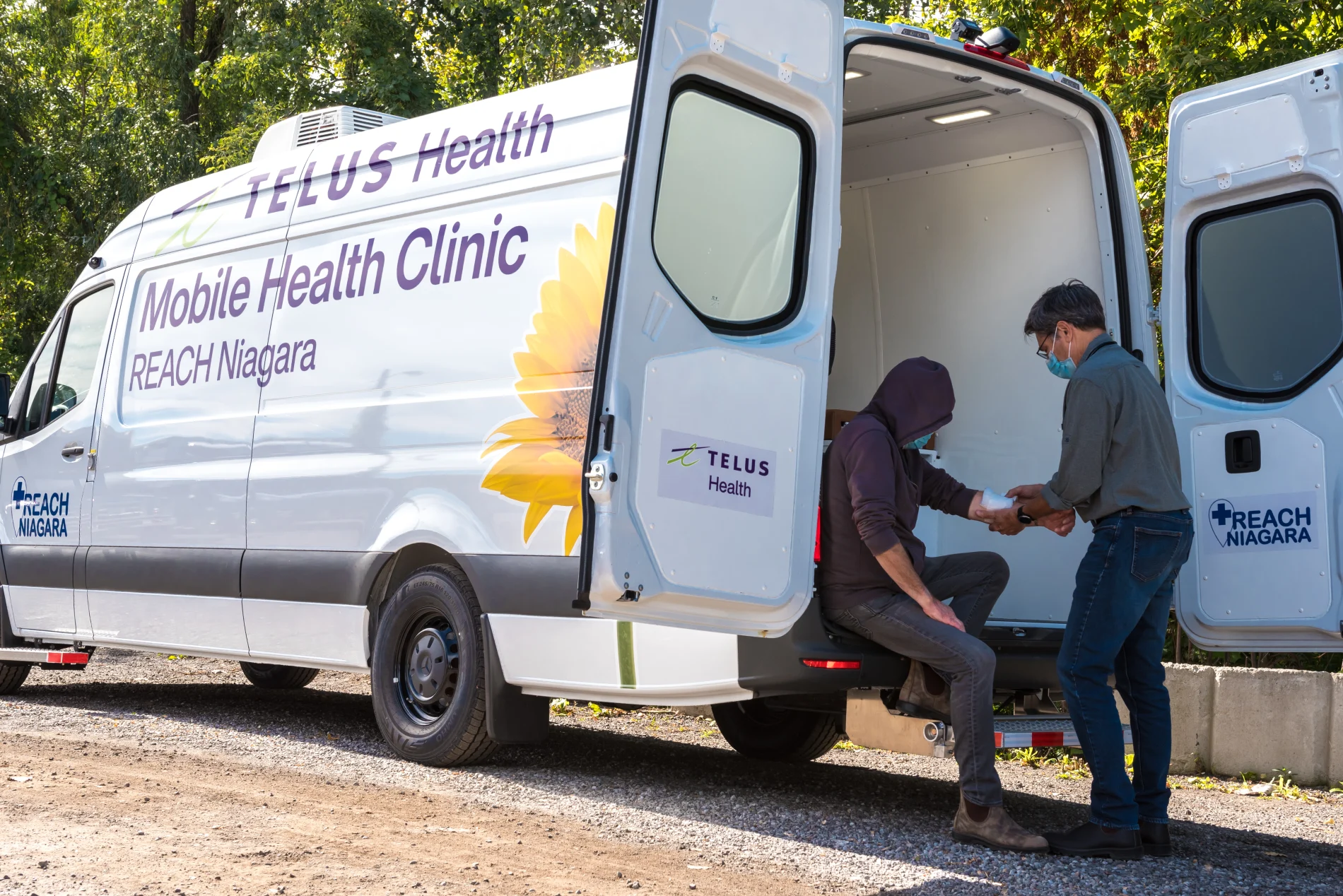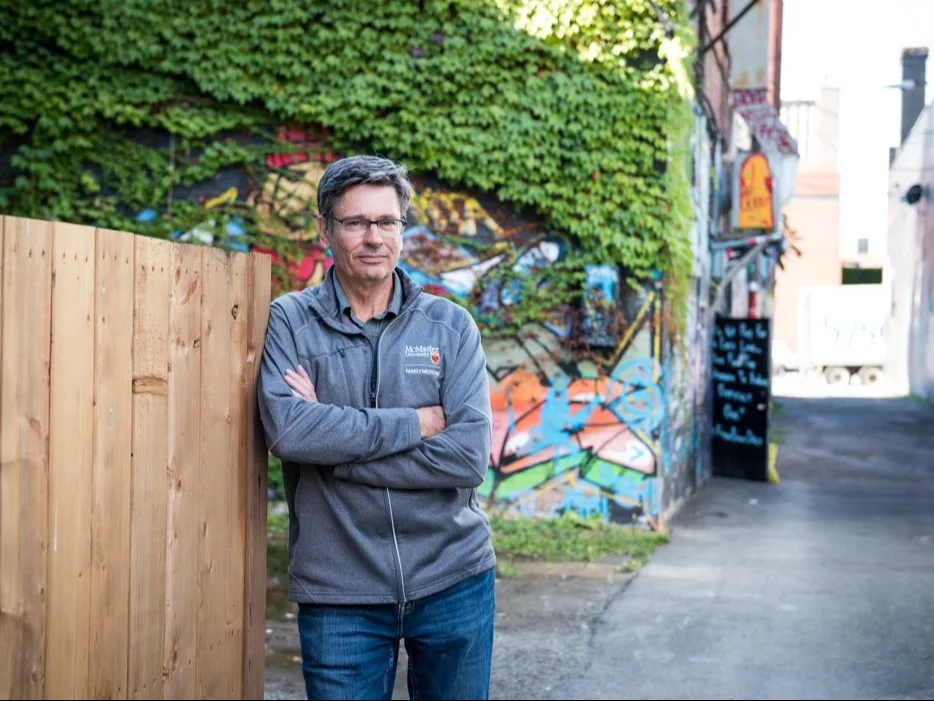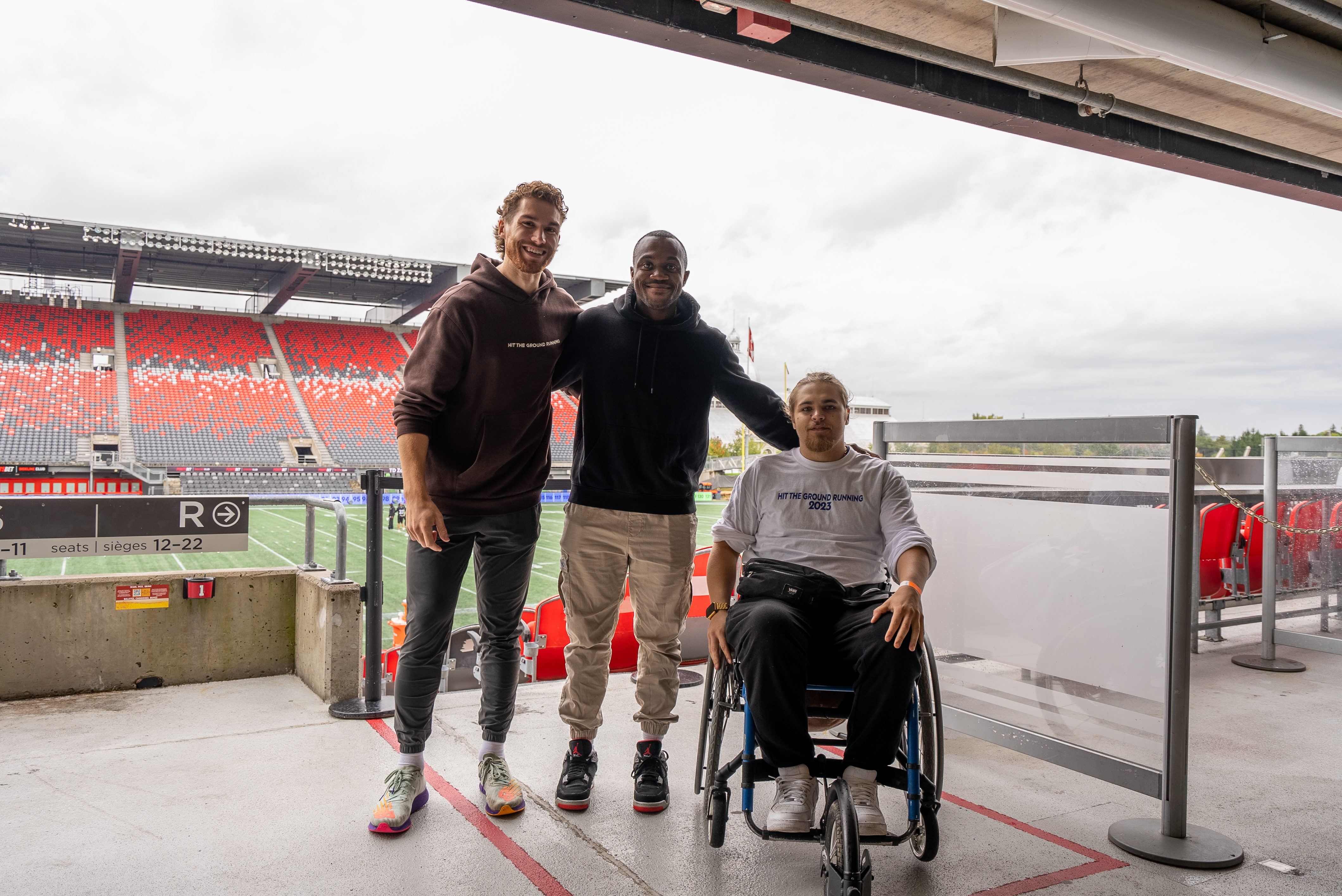(Above) Dr.Karl Stobbe, Medical Director at REACH Niagara. PHOTO BY LISA SAKLUENSKY
In her first year of practice after completing her training at the McMaster University campus in Niagara, Dr. Isabelle Moore did something you may not expect from a newly minted doctor paying off student loans.
Dr. Moore signed on to volunteer weekly with REACH Niagara
(Regional Essential Access to Connected Health), a non-profit that provides primary medical care to underserved area residents. REACH currently exclusively serves homeless people; however, in 2022, plans are in place to extend services to migrant agricultural workers, immigrants and refugees. Going back a few years, Dr. Moore co-led a medical school research project that involved interviewing homeless individuals in Niagara about their experiences accessing healthcare. This work inspired Dr. Karl Stobbe to create REACH – to address the problems identified by Dr. Moore’s team of students.
“I learned about not just the complex barriers homeless patients face in accessing healthcare, but also about their positive experiences. Now, in REACH, they have a provider in whom they trust because they feel they are being listened to,” she says. “It was a very powerful and formative experience for me as a medical student.”
Now, with the launch of The REACH Niagara Mobile Health Clinic in the Niagara region, made possible through an innovative partnership between REACH Niagara and TELUS, the vital work of bringing compassionate care to the area’s underserved and marginalized residents can reach new heights.

The REACH Niagara Mobile Health Clinic, powered by TELUS Health, is a specially equipped clinic on wheels that provides trauma-informed, primary care medical treatments, mental health services, addiction support and COVID-19 screening directly to those in need. PHOTO BY LISA SAKULENSKY
The REACH Niagara Mobile Health Clinic, powered by TELUS Health, is a specially equipped clinic on wheels that provides trauma-informed, primary care medical treatments, mental health services, addiction support and COVID-19 screening directly to those in need.
“The mobile clinic is a huge thing for us,” says Dr. Stobbe, medical director at REACH Niagara. “We instantly have access to all of the underserved pockets that we would not otherwise have had. We can park in any location we want and conduct care services with our healthcare partners on location. And we can easily refer patients to specialists. It’s a very big deal.”
Improving health outcomes
Marginalised people face many barriers to accessing care and can often feel excluded
from mainstream healthcare service models, such as a walk-in clinic or hospital -- a reality that negatively impacts overall health outcomes. For example, those experiencing homelessness may lack transport to get to a healthcare centre, many may not have a valid health card, and others may be challenged to seek help as they grapple with previous trauma and untreated mental illness. To help overcome these barriers, Dr. Stobbe assembled a part-time workforce, as well as partnerships, to build REACH Niagara with the goal of providing the underserved with the kind of primary care that a family doctor would offer. As part of the leadership team with McMaster University, he has also championed several practical social medicine training opportunities for McMaster University Family Medicine residents and medical students.
While famous for its spectacular waterfalls and breathtaking beauty, the Niagara region has more than 1,000 individuals who are homeless and approximately 2,000 living in tenuous housing situations. It is also inundated with opioid-related deaths. In fact, according to Dr. Stobbe, Niagara is consistently in the top five regions in terms of deaths per capita in Ontario. Last year, it was second.
“20 years of research shows that if you improve access to primary care, people live longer, and you have better outcomes. Primary care is the way to go,” says Dr. Stobbe. “COVID-19 has only made things worse and the community desperately needs a solution.”
Government policies have made the digital divide in Canada worse, leaving some communities without optimal internet. Get informed.
Access to all
Aware of the regional challenges, TELUS offered support through its TELUS Health for Good
program. The innovative, $10-million program has enabled similar mobile clinics across the country, including Victoria, Vancouver, Surrey, Edmonton, Ottawa, Mississauga-Peel Region, Toronto, Waterloo Region, Montreal and Halifax. Each clinic is designed with a reception and counselling/consultation area, as well as a private examination room, complete with a custom exam table and specialized equipment. The design enables health providers to safely and respectfully deliver primary healthcare, such as physical examinations, routine testing, contraception, women’s health services, STI treatment, harm reduction services, and mental health services.
Critically, clinics are equipped with TELUS’ cloud-based health electronic medical records (EMR) technology and TELUS LTE Wi-Fi service. In Niagara, that means REACH’s care providers are able to collect and store health data, examine results over time and provide better continuity of care to patients who may have undocumented medical histories.
The idea of caring for patients who are often neglected is what drew Dr. Moore to REACH. But she gained much more than she anticipated as a physician through her in-person interactions.
“I found my experience so rewarding,” she says. “I could see the trust building over time. My patients would come with a concern about a rash, but the very next time they open up about their mental health.”

The mobile clinic will serve as the location for practical social medicine training for McMaster University Family Medicine residents and McMaster medical students, a unique partnership led by Dr. Stobbe. The experience is designed to offer medical students the skills, knowledge and attitudes they will need to care for marginalised people in their future careers. PHOTO BY LISA SAKULENSKY
Building trust
There’s another crucial component to caring that this mobile clinic brings — learning. The mobile clinic will serve as the location for practical social medicine training for McMaster University Family Medicine residents and McMaster medical students. Niagara is one of several training campuses for McMaster University Family Medicine residents and is led by Dr. Stobbe.
This unique partnership offers medical students a glimpse into the skills, knowledge and attitudes they will need to care for marginalised people in their future careers. As part of the leadership team with McMaster University, Dr. Stobbe has championed regional medical training campuses for McMaster University Family Medicine residents and medical students, including in Niagara.
“It is important to be exposed to this kind of training,” says Dr. Moore. “Med students learn through role modelling. If we don’t have this kind of experience—having to learn the history of trauma that comes with ailments—baked in, we will struggle to find the empathy needed to offer care.”
Dr. Moore says that this is especially important considering the high frustration levels often exhibited by doctors and emergency care specialists to marginalised populations.
The TELUS-REACH mobile clinic will also inch Dr. Stobbe towards his ultimate goal: “We want the next generation of family doctors whom we train to look at serving the marginalised as a normal part of what they do in the future.”






